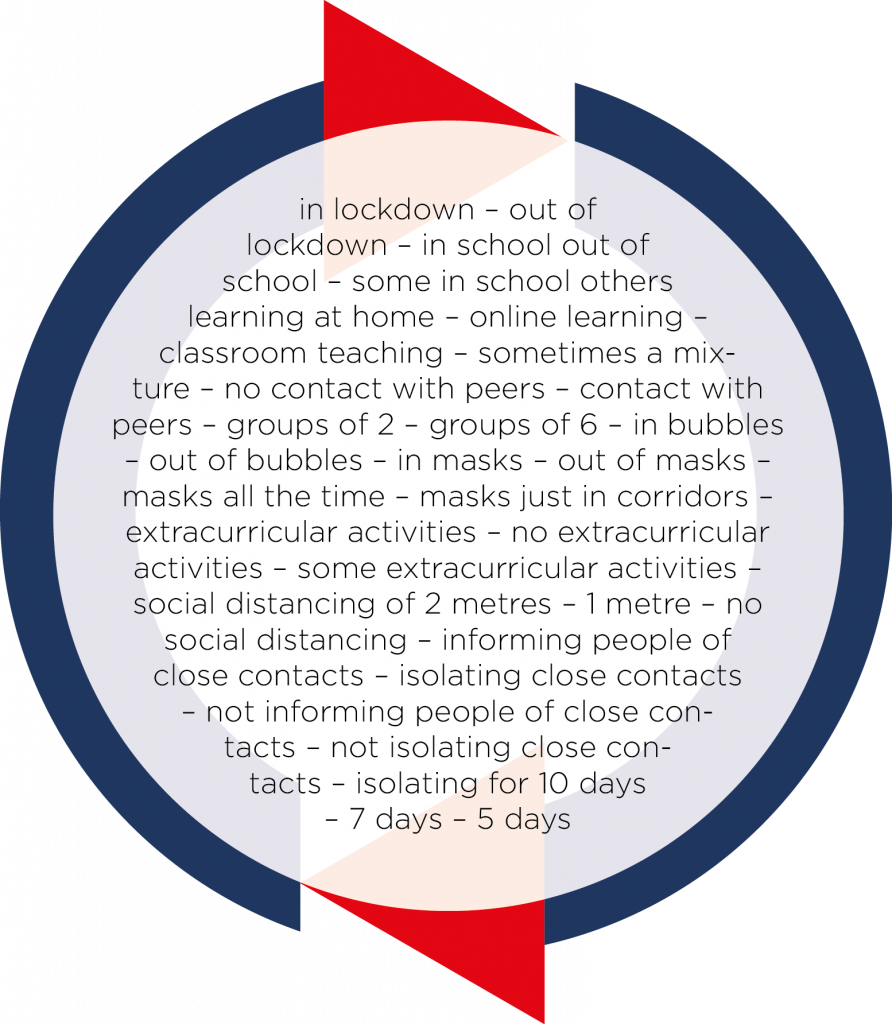A year ago, rates of probable mental disorders in 6 to 16 year olds had increased from one in nine to one in six, since 2017, and 39.2% of the age group had experienced a deterioration in mental health.*
A year on we still face huge challenges, from the pandemic now and from the cumulative effects of the last two years. With covid rates high there is more pressure on education staff and the children in their care. We also face transitions as rules change and restrictions are lifted.
We often look at transitions in the bigger scheme of things, changes of school year, the move from primary to secondary, coming back from holidays etc. In a recent training for educators, we were discussing how we support transitions in schools and how we are experiencing more, as a result of the pandemic. We have been: … and so it goes on. And that’s just coping with the rules and rule changes brought about by this situation.
… and so it goes on. And that’s just coping with the rules and rule changes brought about by this situation.
If we zoom in on the school day, it is full of more transitions. beginning with getting out of bed and everything involved in getting to school on time. In school there is movement from subject to subject or activity to activity, classroom to break time or lunchtime and back again. Then ending a very packed day and returning home to the activities of the afternoon and evening.
For older students there are even more; form time, moving between classrooms and buildings, changing teachers, changing subjects, changing groups of peers in different lessons.
No wonder everyone’s exhausted.
Transitions can be even more subtle. All of our minds wander. What about those moments in class where your attention has gone and then, shifting back into awareness, you realise someone’s asked you a question and you don’t have a clue what they said – this can happen to the adults in the room too . . .
Transitions can be difficult for many of us, even more so if we are tired, don’t like where we’re heading, don’t want to be doing what’s coming next, or don’t like who we are going to be spending our time with. They can be challenging if we aren’t sure about what’s coming up, or if we feel unprepared.
If we are experiencing low mood or anxiety these transitions can be even harder and there may be many other moments of transition that some children might not notice but for others they are really challenging.
A core part of MiSP curricula for all ages from 3 – 18+ are short practices that just take moments and can ground and resource us in the middle of challenge and uncertainty.
We also recognise that, as the adults caring for children and young people, we need to resource ourselves to best support them.
What practices might we use to support us when we notice anxiety at an upcoming transition? How can we resource ourselves in those moments?
Top tips for managing transitions:
- Prepare for bigger transitions beforehand, so you feel organised. Perhaps mentally ‘walk through’ what you will need to do.
- With bigger transitions, break down the changes into smaller achievable steps, ‘chunk it’ and take one small step at a time.
- Reach for help from others who might be able to support you with those transitions and might make them easier for you.
- Decide ahead of making smaller transitions what you might use as an ‘anchor’ to support you in the moment e.g. feet on the floor, breath, sounds.
- Practice pausing just before transitioning into another activity.
- Recognise that you are not alone if you struggle with transitions and offer yourself the kindness you would offer someone else who was struggling.
* https://digital.nhs.uk/data-and-information/publications/statistical/mental-health-of-children-and-young-people-in-england/2021-follow-up-to-the-2017-survey
Here’s a short grounding practice if you’d like to have a go.
Here’s an example of our Schools Sit Together with Ben Chalwin, MiSP’s Head of Training leading a practice for adults and students.
Our .breathe curriculum is designed to support 9-14 year olds, it’s open to educators whether they have experience of mindfulness or not and is a one-day training with a wealth of resources that can be taken straight into the classroom.